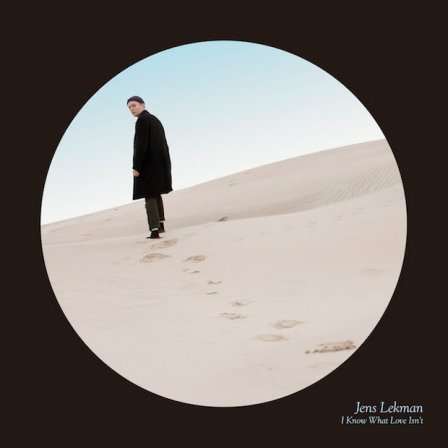Listening to Jens Lekman’s newest, I Know What Love Isn’t, I found myself thinking of that bizarre little track “It’s Oh So Quiet” from Bjӧrk’s 1995 album Post. In what may be the closest Bjӧrk’s ever come to letting her kitschy-yet-deeply-felt instincts cross the unspoken line between “serious” and “funny,” she decided to illustrate what she saw as two fundamental halves of life with a contrast of sheer musical size: “you fall in love” was accompanied by a blat of big band brass so huge and colorful that it seemed like it had to be a sample; “it’s over” got a tiptoeing clarinet and plucks so innocuous and uncaring that it seemed like it had to be the work of studio musicians. Again, not exactly funny, but certainly tongue-in-cheek. More crucially, we wouldn’t be nearly so keen on one half of the song or the other on its own. That’d be public domain, background. What meaning it holds sits entirely in contrast, in the miniscule cleft between.
It’s easy to imagine Lekman, who’s walked a delicate line between heartfelt and funny for most of his career, approving of this sort of songwriting tactic. At his best, he’s the master of contrasts: a hyperbolic love song that slowly reveals a narrator jailed with his head up his own ass; another about stealing and actually attempting to walk a mile in another’s shoes (and ultimately declaring, “You’re a dick! That’s your new title”). Last we heard from him, he was belting, “I swear I’ll never kiss anyone who doesn’t burn me like the sun!” over a string and kettledrum crescendo (we were just coming off Illinois then, recall) before admitting, tellingly, “things get more complicated when you’re older.”
It’s likely that things did get more complicated for Lekman in the long stretch between Night Falls Over Kortedala and his third full-length album, I Know What Love Isn’t. But a lot of that complexity never quite surfaces. He wishes that he’d never met the excessively symbolic “Erica America” the same way “I wish I’d never tasted wine,” a line that says a lot about the feel of the album: he’s swishing melancholy experiences around in his mouth and possibly getting a lot out of them, but his commentary is either meandering (“The World Moves On” is so diary-like that it fails to establish a mood apart from bouncing-around-Europe-drinking-wine momentum and indifference — which, we’ll see, may be the point) or cliché. Either way, Lekman’s a skilled and deliberate enough lyricist to remain in full command. When he repeatedly sings, in a gorgeous, ringing melody, “She Just Don’t Want To Be With You Anymore,” he sounds like he’s insisting simplicity against complexity, nuance, overanalysis, rationalization, or any other defense mechanism: quit it, man; get a hold of yourself; she just don’t.
This weirdly frustrating potential energy, this waiting for the other shoe to drop, propels the album above all else, and a generous reading might be that Lekman is employing the deep trust that his fans have in him to leverage the banalities of heartbreak and age. That is, his watching footage of wheat fields and making out in every bar in town (on his birthday) during “The World Moves On” are deliberately flavorless. No doubt that having articulated the complexity and awkwardness of friendship as gleefully as he did on “Postcard To Nina” adds a particular weight to his sudden speechlessness — “She asks you what’s wrong/ You say ‘nothing/ It’s nothing at all’” — and a gouge to his elliptical pacing — “[It’s just] a sadness of its not being something else other than itself.” See, unlike the banalities of love (see again: “You Are the Light,” “I Remember Every Kiss”), these grey tones are not so easily oversold or worn on one’s sleeve; he couches them in the musical lexicon of much older artists, smooth jazz, flutes, bossa nova percussion. If any of this is sampled, no one’s bothered to mention it; instead, the arrangements carry themselves like studio musicianship, both autonomic and anodyne. In short, it’s just a hair short of being banal enough to come off as wit.
“And that’s what it’s like when you’ve had your heart broken:/ The world just shrugs its shoulders.” There’s enough buried truth — not to mention enough of those “nice melodies” Lekman is all about — in I Know What Love Isn’t to make me feel like a fair-weather friend by shrugging my shoulders here. But it’s hard to avoid detecting a thread of disappointment in even the forgiving responses to this album. Lekman’s lucky charm has always been that of the naïve-but-freaking-adorable, a charm that his charm seems uncalculated or accidental, and thus infinitely renewable; what happens when a field recording of a faceless female has to provide the laugh track to the line “Let’s get married/ I’m serious/ But only for the citizenship,” or when his musings on would-be geekily specific chords falling flat… fall flat?
Whether or not it’s fitting (or even graceful) to make an album about not being on the top of one’s game in response to not, what makes this record qualitatively distinct is the sudden sense, from a guy who could have written 10 more songs about any number of single situations presented in previous work, of exhaust. At the end of the album, no stone on the topic of love and disillusionment feels unturned. Such is the strange comfort of blanket statements, but Lekman’s fans may still feel the pea-like irritant of stories lanky and untold. There’s something to be said for writing about what’s most significant in one’s life, but I’d still take “Postcards From Nina’s Dad” over a concept album on tapering heartbreak any day.
More about: Jens Lekman




